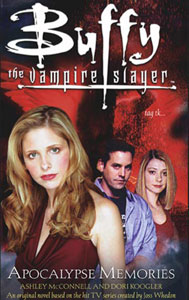“Roswell High” authors Laura J. Burns and Melinda Metz – who also wrote for the “Roswell” TV series – try their hand at “Buffy” with “Apocalypse Memories” (March 2004), an imperfect but intriguingly out-of-the-box entry. Set early in Season 7, the book delves into religious theory and asks “What would happen if Buffy was pitted against the forces of good instead of evil?”
It’s sort of a trick question, because the angel Michael – who is carrying out the one and only task of his existence, to end the world – is functionally the bad guy. But according to Giles’ research, he’s considered good by many religious texts.
By doing this deep a dive into religion, “Apocalypse Memories” has a tricky task, since the Buffyverse usually keeps the topic at arm’s length, at least in terms of exploring the merits of religious beliefs.
Of course, religion is quite present on the surface, as Joss Whedon’s saga borrows Christian iconography in several cases. Crosses and holy water keep vampires at bay, Buffy believes she’s in Heaven when she dies, and Caleb embodies religious extremism. There isn’t a singular Hell, but there are plenty of candidates, notably the one Angel goes to between Seasons 2 and 3, the one Buffy visits in “Anne” (3.1), and the one Los Angeles descends into in “Angel: After the Fall.” The most thorough religious allegory from the two TV series is Jasmine’s dishonest influence over people in “Angel” Season 4, but that stays in the range of allegory rather than flat-out critique like “Memories.”
(Side thought: In the Buffyverse, the First Slayer and the First Vampire exist before Christianity. Yet the cross and holy water harm vampires. Obviously, Whedon is just borrowing from previous vampire lore. But within the Buffyverse itself, there’s a story that needs to be told: How and why do Christian symbols harm vampires?)
For all the iconography present, none of the main characters are particularly religious. (Willow is culturally Jewish, not noticeably religiously Jewish.) So arguably, it should not matter a lick to any of them that Michael comes from religious lore as opposed to the other books in Giles’ collection. They should oppose him because he aims to end the world; no further debate needed.
While Buffy does indeed try to fight Michael, and then try to reason with him, a lot of pages are spent on the religious debate the authors are determined to insert into the narrative. Burns and Metz select Giles as the one who argues for the legitimacy of the religious point of view. “Just as our world had a beginning, it will have an end, an end that is natural and right,” Giles says on page 86, sharing his research findings. Then on page 90, he goes on to suggest they not try to fight this apocalypse, because it’s a good apocalypse, one leading to rebirth for the world: “I was trained to fight the forces of evil. Not to do battle with others on my own side.”

While I don’t totally buy that Giles would think this way, it does allow for a religious critique. All of the characters with some demon in them are judged to be wicked, as boils form on their skin. That’s Anya and Spike, the latter of whom has reformed so much that he purposely acquires a soul. Anya has backslid recently, but she’s not obviously wicked either. Meanwhile, the rest of the gang is fine, including Willow, who is coming off her recent Dark Willow phase. So Burns and Metz are perhaps examining the shallowness and/or hypocrisy of Scripture here.
In terms of characterization, “Memories” is a nice piece about Xander helping Willow to do some basic spells to get her confidence back. It’s sort of a sequel to the ending of Season 6, where Xander talks Willow back from the brink of destroying the world. Spike’s portrayal is slightly off; the authors pay lip service to the newly ensouled vampire acting nutso in early Season 7, but he is acting normal in this book, set right after “Same Time, Same Place” (7.3). This suggests The First is taking a break from messing with him. (Which actually makes a certain amount of sense. The First could be ceding the playing field to Michael for the duration of this story.)
There’s one other seeming continuity problem that ends up not being a problem after all. This story is massive in scope. It’s a bigger apocalypse than even what comes from Jasmine on “Angel.” It’s so big that a reader can’t help but think “This is too epic for a side adventure.” But the conclusion to “Apocalypse Memories” has an answer for that critique, while also putting Willow back on the path of confidence in her magic (although this jumps the gun on her Season 7 arc).
“Apocalypse Memories” is uneven, but I have to respect Burns and Metz for writing a different kind of “Buffy” book. The apocalypse is old hat in this saga, but they manage to put a fresh spin on it.
Click here for an index of all of John’s “Buffy” and “Angel” reviews.

